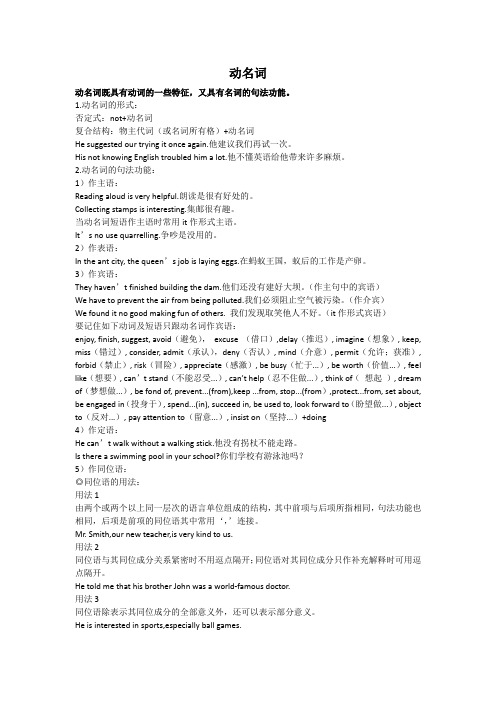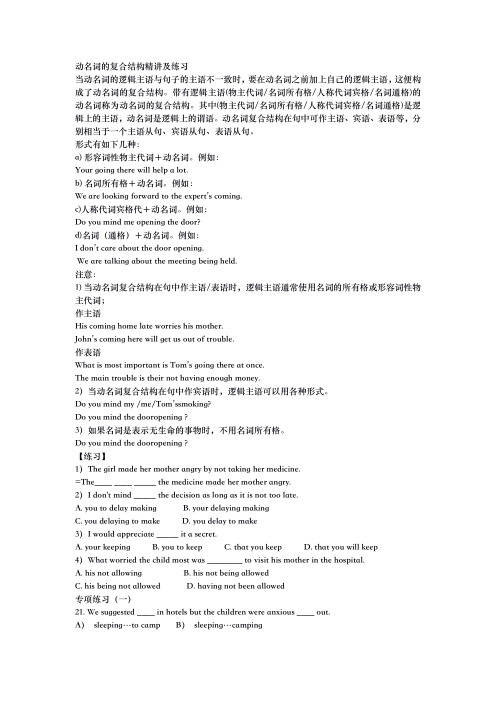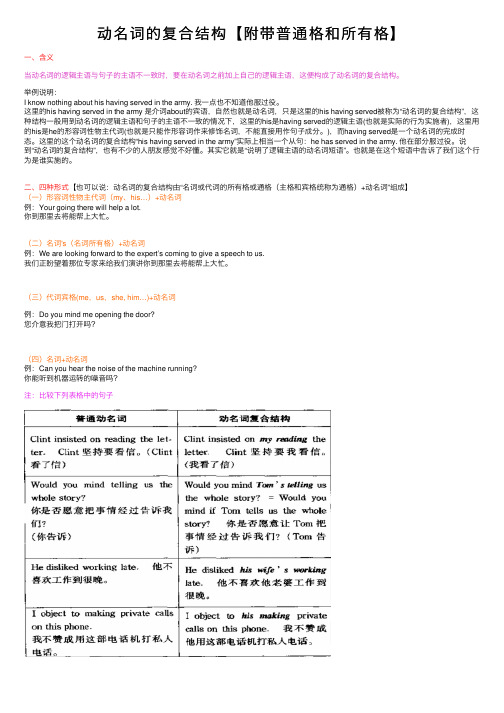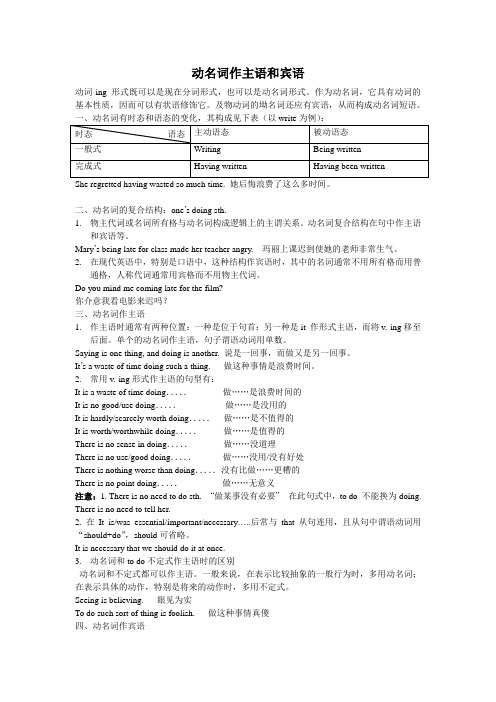动名词复合结构的形式
动名词复合结构的讲评

动名词复合结构的讲评带有逻辑主语的动名词叫做“动名词复合结构”,其形式有如下两种:a)名词所有格/物主代词+动名词,如:I insist on Mary’s going there. 我坚持要玛丽到那儿去。
I had not heard of your being ill. 我没听说你病了。
b)名词通格/人称代词宾格+动名词,如:Usually at the beginning of school, the noise of desks being openedand cl osed, and lessons repeated at the top of the children’s voicescould be heard out in the street.In fact, I think it’s very much nicer without him, if you don’t mindme saying so.在确定逻辑主语的格的形式时须注意以下几点:1)动名词复合结构作主语时一般用名词所有格或物主代词。
例如:Nixon’s vi siting China marked a new ear between U.S. and Chinadiplomatic relations. 尼克松访问中国标志着中美外交关系进入一个新的时代。
2)在口语和非正式语体中,只要不是作主语,动名词复合结构中的逻辑主语常采用名词通格或人称代词宾格。
例如:The doctor does not mind me /my eating a little meat occasionally.代夫并不反对我偶尔吃一点肉。
3)如果逻辑主语是一个短语或有修饰语,一般用名词通格或人称代词的宾格的形式。
例如:The teacher insisted on the boy who threw the eraser apologizing.老师支持要那个扔掉刷子的男孩道歉。
英语得四大复合结构

英语得四大复合结构英语得复合结构由两个部分组成:一个部分表示人或者物,另一个部分表示动作或者状态。
两个部分之间存在逻辑上得主谓关系,就就是第一部分得人或物就是第二部分动作得执行者或承受者,或者,第二部分所表示得状态就就是第一部分所表示得人或物所处得状态。
例如: We think a good knowledge of English as necessary as an excellent ability to municate in the work of a foreign affairs official、(英语必不可少)With stepping stones along the road, you don’t have to walk in the mud、(沿路得就是石头) 1.动词不定式得复合机构:for sb to do sthPlease find some work for the children to do、(孩子们做工作)The book is too difficult for me to read, (我读不懂)2.动名词得复合结构:sb’s / sb doing sth动名词得复合结构有四种形式:①形容词性物主代词+动名词Do you mind my leaving now?I had not heart of your being ill、形容词性物主代词:指得就是可以修饰名词得物主代词:your my her his its their补充:名词性物主代词:指得就是充当名词成分得物主代词如mine yours hers his its theirs②名词’s +动名词Jack’s not getting to the station on time made all of us angryDo you mind Jack’s leaving now?I insisted Mary’s going there、③代词+动名词Do you mind me leaving now?In fact, I think it’s very much nicer without him, if you don’t mind me saying so④名词+动名词Do you mind Jack leaving now?动名词得复合结构可在句中作主语、宾语。
动名词复合结构VS分词独立主格结构

1. 名词(代词) + 现在分词: The clock striking twelve, I went to bed.
2. 名词(代词) + 过去分词: Enough time given, she will do the job better.
3. 名词(代词) + 不定式: Here are the first three volumes, the fourth one to
b 作宾语时,可以用: 名词/人称代词宾格+动名词
也可以用:名词所有格/物主代词+动名词 如:
1. I don't mind Mary being late here.
2. In fact, I think it’s very much nicer without him, if you don’t mind me saying so.
动名词的复合结构 VS
独立主格结构
一. 动名词的复合结构
动名词的复合结构在句中主要用作主语和宾 语
动名词的形式: a. 作主语时,用名词所有格/物主代词+动名词,
如:
1. Mary's being late for class made her
teacher very angry. 2. Her coming to help encouraged all of us.
独立主格结构
7. Have you heard of my sister’s winning the contest?
动名词复合结构
8. He was listening attentively in class, his eyes fixed on the blackboard.
高中英语语法(动名词)

答案:D
9 Have you considered _____a course in business for artist? A. your taking B. taking C you taking D being taken 答案 B
精锐教育网站:
-4-
精锐教育·教学管理部
【分析】其实答案应选 B。比较以下结构:
can’t help to do sth = 不能帮助做某事
can’t help doing sth = 禁不住做某事,情不自禁地做某事
3. How about the two of us _____ a walk down the garden?
A. to take
6. I live in the house with its door_________to the south.(这里 with 结构作定语)
A. facing
B. faces C. faced
D. being faced
答案:A
7. With a lot of difficult problems _______, the newly-elected president is having a hard time. A. settled B. settling C. to settle D. being settled 答案为 C 【解析】with+ 动名词组成的复合结构。动词不定式 to settle 作为 difficult problems 的定语表示现在 或将来要解决的难题;过去分词 settle 作定语表示已经解决的难题,现在分词的被动式 being settled 作定语表示正在解决的难题。
Her parents insisted on her studying medicine. 她父母坚持要她学医。 Have you heard of my sister’s winning the contest? 我妹妹在竞赛中获胜的事你听说了 吗? 3) 作介词宾语 I don’t like the idea of our living here. 我不愿意我们住在这里。 I knew nothing about the window being open.我一点也不知道窗户敞开着。 He left the city without our knowing it 他离开城市我们大家都不知道。. 4) 作表语 What is most important is Tom’s going there at once. The main trouble is their not having enough money.
动名词复合结构例句

动名词复合结构的概念、形式和用法动名词复合结构是一种由动名词和其逻辑主语构成的非谓语动词结构,可以在句中充当主语、宾语、表语、定语等成分。
动名词复合结构的形式有四种,分别是:名词所有格或物主代词+动名词,如:His leaving early surprised us.名词普通格或人称代词宾格+动名词,如:I saw him running in the park.名词或代词+of+动名词,如:The idea of going abroad appealed to him.for+名词或代词+to do,如:It is hard for me to understand him.动名词复合结构的用法有一些特殊情况和注意事项,本文将从以下几个方面进行介绍:动名词复合结构的形式选择动名词复合结构的否定、被动和完成形式动名词复合结构的作用和位置动名词复合结构的常见搭配和固定用法一、动名词复合结构的形式选择动名词复合结构的形式选择主要取决于动名词在句中的作用和位置,以及动名词的逻辑主语的类型和意义。
一般来说,有以下几个原则:当动名词复合结构作主语时,通常用名词所有格或物主代词+动名词的形式,如:His smoking is bad for his health. 他的吸烟对他的健康不利。
当动名词复合结构作宾语时,如果宾语后面没有其他补足成分,可以用名词所有格或物主代词+动名词的形式,也可以用名词普通格或人称代词宾格+动名词的形式,两者的意义和语气有所不同。
前者强调动作本身,后者强调动作的执行者,如:I appreciate your helping me. 我感谢你帮助我。
(强调帮助这个动作)I appreciate you helping me. 我感谢你帮助我。
(强调你这个人)当宾语后面有其他补足成分时,通常用名词普通格或人称代词宾格+动名词的形式,如:I caught him stealing money from the drawer. 我抓到他从抽屉里偷钱。
动名词

非谓语动词II——动名词动名词既具有动词的一些特征,又具有名词的句法功能。
否定式:not+动名词完成式表示其动作发生在谓语动作之前。
动名词复合结构:名词普通格/名词所有格/人称代词宾格/形容词性物主代词+doingeg. Do you mind Tom/ Tom’s/ him/ his opening the door?Tom’s / His failing in the exam made his father disappointed.动名词短语作_____语时,其逻辑主语只能用___________和___________两种形式。
Is there any hope of our team winning the match?逻辑主语是无生命名词时,通常只用名词__________。
She was woken up by somebody shouting outside.逻辑主语是指示代词this,that或不定代词somebody, someone, nobody, no one, anybody, anyone时,只用普通格。
练习:1. Seeing is __________. 眼见为实。
2. He came to the party without ____________________.他未被邀请就来到了晚会。
3. We remembered _____________________the film. 我们记得看过这部电影。
4. He forgot ________________________ to Guangzhou when he was five years old.他忘记五岁时曾被带到广州去过。
5. I regret______________________ his advice. 我后悔没听他的劝告。
6. I’m sorry for ________________________________. 我为他没能通过驾驶考试而感到遗憾。
动名词复合结构的用法

动名词复合结构的用法(最新版)编制人:__________________审核人:__________________审批人:__________________编制单位:__________________编制时间:____年____月____日序言下载提示:该文档是本店铺精心编制而成的,希望大家下载后,能够帮助大家解决实际问题。
文档下载后可定制修改,请根据实际需要进行调整和使用,谢谢!并且,本店铺为大家提供各种类型的经典范文,如词性大全、句法大全、句型大全、从句大全、时态大全、语态大全、语法大全、虚拟语气、用法辨析、其他资料等等,想了解不同范文格式和写法,敬请关注!Download tips: This document is carefully compiled by this editor.I hope that after you download it, it can help you solve practical problems. The document can be customized and modified after downloading, please adjust and use it according to actual needs, thank you!In addition, this shop provides you with various types of classic sample essays, such as part of speech, syntax, sentence pattern, clause, tense, voice, grammar, subjunctive, usage analysis, other materials, etc. If you want to know the different formats and writing methods of the model essay, please pay attention!动名词复合结构的用法带有逻辑主语的动名词叫做“动名词复合结构”,其形式有如下两种:a)名词所有格/物主代词+动名词,如:I insist on Mary's going there. 我坚持要玛丽到那儿去。
英语中动名词复合结构的用法

英语中动名词复合结构的用法带有逻辑主语的动名词叫做“动名词复合结构”,其形式有如下两种:a)名词所有格/物主代词+动名词,如:I insist on Mary's going there. 我坚持要玛丽到那儿去。
I had not heard of your being ill. 我没听说你病了。
b)名词通格/人称代词宾格+动名词,如:Usually at the beginning of school, the noise of desks being opened and closed, and lessons repeated at the top of the children's voices could be heard out in the street. In fact, I think it's very much nicer without him, if you don't mind me saying so.在确定逻辑主语的格的形式时须注意以下几点:1)动名词复合结构作主语时一般用名词所有格或物主代词。
例如:Nixon's visiting China marked a new ear between U.S. and China diplomatic relations. 尼克松访问中国标志着中美外交关系进入一个新的时代。
2)在口语和非正式语体中,只要不是作主语,动名词复合结构中的逻辑主语常采用名词通格或人称代词宾格。
例如:The doctor does not mind me /my eating a little meat occasionally.代夫并不反对我偶尔吃一点肉。
3)如果逻辑主语是一个短语或有修饰语,一般用名词通格或人称代词的宾格的形式。
例如:The teacher insisted on the boy who threw the eraser apologizing.老师支持要那个扔掉刷子的男孩道歉。
英语复合结构

一、英语复合结构1、概述??英语复合结构是一种特殊的句子成分,它由两部分组成:第一部分是名词或代词,第二部分表示动作或者状态。
从逻辑上看,两个部分之间存在逻辑上的主谓关系,很像句子的主语和谓语,但从结构上看却与句子中的主谓关系不同,区别在于复合结构的第二部分不是谓语形式,而是由动词的非谓语形式及其他词类或介词短语、从句组成的短语。
英语复合结构包括:动名词复合结构、分词复合结构和不定式复合结构。
2、动名词复合结构(1)?结构形式:①形容词性物主代词+动名词;②名词's+动名词;③代词宾格+动名词;④名词+动名词。
? (2)?功能★?作主语? ?His/He coming home late worries his other.? ?John s /John coming here will get us out of trouble.约翰的到来将会使我们脱离困境。
★?作动词或短语动词的宾语? ? I don’t remember him/his giving me that book.??? ? Her parents insisted on her studying medicine.?她父母坚持要她学医。
★?作介词宾语?? I don’t like the idea of our living here.?我不愿意我们住在这里。
? ?I knew nothing about the window being open.我一点也不知道窗户敞开着。
? ?He left the city without our knowing it?他离开城市我们大家都不知道。
.?★?作表语?? What is most important is Tom’s going there at once.?? The main trouble is their not having enough money.?? ?His being late again made the teacher angry.?(他迟到)?? Would you mind my / me smoking here? (我抽烟)?动名词复合结构不在句首时可以用“宾格加动名词”。
关于动名词复合结构的用法

关于动名词复合结构的用法以下是小编给大家整理的关于动名词复合结构的用法,希望可以帮到大家带有逻辑主语的动名词叫做“动名词复合结构”,其形式有如下两种:a)名词所有格/物主代词+动名词,如:I insist on Mary's going there. 我坚持要玛丽到那儿去。
I had not heard of your being ill. 我没听说你病了。
b)名词通格/人称代词宾格+动名词,如:Usually at the beginning of school, the noise of desks being opened and closed, and lessons repeated at the top of the children's voices could be heard out in the street. In fact, I think it's very much nicer without him, if you don't mind me saying so.在确定逻辑主语的格的形式时须注意以下几点:(1) 动名词复合结构作主语时一般用名词所有格或物主代词。
Nixon's visiting China marked a new ear between U.S. and Chinadiplomatic relations. 尼克松访问中国标志着中美外交关系进入一个新的时代。
2) 在口语和非正式语体中,只要不是作主语,动名词复合结构中的逻辑主语常采用名词通格或人称代词宾格。
例如:The doctor does not mind me /my eating a little meat occasionally.代夫并不反对我偶尔吃一点肉。
3) 如果逻辑主语是一个短语或有修饰语,一般用名词通格或人称代词的宾格的形式。
例如:The teacher insisted on the boy who threw the eraser apologizing.老师支持要那个扔掉刷子的男孩道歉。
动名词和现在分词

动名词动名词既具有动词的一些特征,又具有名词的句法功能。
1.动名词的形式:否定式:not+动名词复合结构:物主代词(或名词所有格)+动名词He suggested our trying it once again.他建议我们再试一次。
His not knowing English troubled him a lot.他不懂英语给他带来许多麻烦。
2.动名词的句法功能:1)作主语:Reading aloud is very helpful.朗读是很有好处的。
Collecting stamps is interesting.集邮很有趣。
当动名词短语作主语时常用it作形式主语。
It’s no use quarrelling.争吵是没用的。
2)作表语:In the ant city, the queen’s job is laying eggs.在蚂蚁王国,蚁后的工作是产卵。
3)作宾语:They haven’t finished building the dam.他们还没有建好大坝。
(作主句中的宾语)We have to prevent the air from being polluted.我们必须阻止空气被污染。
(作介宾)We found it no good making fun of others. 我们发现取笑他人不好。
(it作形式宾语)要记住如下动词及短语只跟动名词作宾语:enjoy, finish, suggest, avoid(避免),excuse (借口),delay(推迟), imagine(想象), keep, miss(错过), consider, admit(承认),deny(否认), mind(介意), permit(允许;获准), forbid(禁止), risk(冒险), appreciate(感激), be busy(忙于...), be worth(价值...), feel like(想要), can’t stand(不能忍受...), can’thelp(忍不住做...), think of(想起), dream of(梦想做...), be fond of, prevent...(from),keep ...from, stop...(from),protect...from, set about, be engaged in(投身于), spend...(in), succeed in, be used to, look forward to(盼望做...), object to(反对...), pay attention to(留意...), insist on(坚持...)+doing4)作定语:He can’t walk without a walkingstick.他没有拐杖不能走路。
动名词的复合结构用法

动名词的复合结构用法动名词的复合结构有四种形式:1.容词性物主代词+动名词;2.名词's+动名词;3.代词宾格+动名词;4.名词+动名词。
动名词的复合结构可在句中作主语或宾语。
作主语时,不能用第三和第四种形式;无生命名词不能用第二种形式,无论是作主语还是作宾语。
动名词的复合结构实际上是给动名词加了一个逻辑主语。
例如:His/Jack'___ on time made all of us worried。
他/___没准时到火车站使得我们大家都很担心。
Do you ___?我/___现在离开你介意吗?可以说:I appreciate you very much!动名词复合结构指的是“名词所有格或物主代词后面加上动名词”的形式。
在动名词复合结构中,动名词前面的所有格名词或物主代词所指代的人或事物就是该动名词的逻辑主语。
例如:My ___'___ surprise。
我父亲的到来是一个惊喜。
(coming的逻辑主语是my father)Your talking back made mereally disappointed。
你的顶嘴让我很失望。
(talk back的逻辑主语是you)动名词复合结构是一个非常实用的语言结构。
我们在对某个人或事物的行为状态进行描述的时候,有时候往往找不到直接对应的名词,比如“你的迟到让我生气”这个句子中的主语是“你的迟到”,但很明显没有一个具体的名词可以作这里的主语,于是用动名词复合结构表现出来就很简单:Your being ___.在当代英语中,如果动名词复合结构是作宾语,则经常出现名词通用格(或人称代词的宾格)直接加动名词的形式。
例如:I ___(I hate your lying to me) 我讨厌你对我撒谎。
___)。
英语中动名词的复合结构

带有逻辑主语的动名词叫做动名词的复合结构,通常用物主代词、名词所有格等来表示逻辑主语,而且要放在动名词前面。
一、动名词复合结构的类型1、名词所有格 + 动名词,通常指有生命的名词或名词短语,例如:John’s winning of the competition made many people happy.约翰在比赛中获胜使许多人感到高兴。
We were all sorry about Jane's losing her parents like that.简那样失去父母,我们都很难过。
My friend’s talking annoys people listening to her.我朋友的讲话使听她的人很恼火。
They objected to the youngest girl's being given the command position. 他们反对让最小的女孩担任指挥职务。
Federico was pleased by Carlos's making the Dean's List for the first time.费德里科对卡洛斯第一次进入院长名单感到高兴。
2、名词普通格 + 动名词A、当动名词的逻辑主语有其他词修饰时,要用普通格。
例如:Federico was pleased by Carlos, his oldest son, making the Dean's List for the first time.费德里科对他的大儿子卡洛斯第一次进入院长名单感动高兴。
解析:同位语his oldest son 修饰Carlos,用普通格。
B、当动名词的逻辑主语是复数的,集体的或无生命的名词时,通常要用普通格。
例如:Professor Villa was amazed by her students working as hard as they did. 维拉教授对她的学生们的努力工作感到惊讶。
上海英语高考翻译之动名词的复合结构精讲及练习

动名词的复合结构精讲及练习当动名词的逻辑主语与句子的主语不一致时,要在动名词之前加上自己的逻辑主语,这便构成了动名词的复合结构。
带有逻辑主语(物主代词/名词所有格/人称代词宾格/名词通格)的动名词称为动名词的复合结构。
其中(物主代词/名词所有格/人称代词宾格/名词通格)是逻辑上的主语,动名词是逻辑上的谓语。
动名词复合结构在句中可作主语、宾语、表语等,分别相当于一个主语从句、宾语从句、表语从句。
形式有如下几种:a)形容词性物主代词+动名词。
例如:Your going there will help a lot.b)名词所有格+动名词。
例如:We are looking forward to the expert’s coming.c)人称代词宾格代+动名词。
例如:Do you mind me opening the door?d)名词(通格)+动名词。
例如:I don’t care about the door opening.We are talking about the meeting being held.注意:1)当动名词复合结构在句中作主语/表语时,逻辑主语通常使用名词的所有格或形容词性物主代词;作主语His coming home late worries his mother.John’s coming here will get us out of trouble.作表语What is most important is Tom’s going there at once.The main trouble is their not having enough money.2)当动名词复合结构在句中作宾语时,逻辑主语可以用各种形式。
Do you mind my/me/Tom’ssmoking?Do you mind the dooropening?3)如果名词是表示无生命的事物时,不用名词所有格。
高考英语动名词的复合结构专项复习

高考英语动名词的复合结构专项复习一、动名词的复合结构当动名词的逻辑主语与句子的主语不一致时,要在动名词之前加上自己的逻辑主语,这便构成了动名词的复合结构。
带有逻辑主语(物主代词/名词所有格/人称代词宾格/名词通格)的动名词称为动名词的复合结构。
其中(物主代词/名词所有格/人称代词宾格/名词通格)是逻辑上的主语,动名词是逻辑上的谓语。
动名词复合结构在句中可作主语、宾语、表语等,分别相当于一个主语从句、宾语从句、表语从句。
形式有如下几种:a)形容词性物主代词+动名词。
例如:Your going there will help a lot.b)名词所有格+动名词。
例如:We are looking forward to the expert’s coming.c)人称代词宾格代+动名词。
例如:Do you mind me opening the door?d)名词(通格)+动名词。
例如:I don’t care about the door opening.We are talking about the meeting being held.注意:1)当动名词复合结构在句中作主语/表语时,逻辑主语通常使用名词的所有格或形容词性物主代词;作主语His coming home late worries his mother.John’s coming here will get us out of trouble.作表语What is most important is Tom’s going there at once.The main trouble is their not having enough money.2)当动名词复合结构在句中作宾语时,逻辑主语可以用各种形式。
Do you mind my /me/Tom’s smoking?Do you mind the door opening ?3)如果名词是表示无生命的事物时,不用名词所有格。
动名词的复合结构【附带普通格和所有格】

动名词的复合结构【附带普通格和所有格】⼀、含义当动名词的逻辑主语与句⼦的主语不⼀致时,要在动名词之前加上⾃⼰的逻辑主语,这便构成了动名词的复合结构。
举例说明:I know nothing about his having served in the army. 我⼀点也不知道他服过役。
这⾥的his having served in the army 是介词about的宾语,⾃然也就是动名词,只是这⾥的his having served被称为“动名词的复合结构”,这种结构⼀般⽤到动名词的逻辑主语和句⼦的主语不⼀致的情况下,这⾥的his是having served的逻辑主语(也就是实际的⾏为实施者),这⾥⽤的his是he的形容词性物主代词(也就是只能作形容词作来修饰名词,不能直接⽤作句⼦成分。
),⽽having served是⼀个动名词的完成时态。
这⾥的这个动名词的复合结构“his having served in the army”实际上相当⼀个从句:he has served in the army. 他在部分服过役。
说到“动名词的复合结构”,也有不少的⼈朋友感觉不好懂。
其实它就是“说明了逻辑主语的动名词短语”。
也就是在这个短语中告诉了我们这个⾏为是谁实施的。
⼆、四种形式【也可以说:动名词的复合结构由“名词或代词的所有格或通格(主格和宾格统称为通格)+动名词”组成】(⼀)形容词性物主代词(my、his…)+动名词例:Your going there will help a lot.你到那⾥去将能帮上⼤忙。
(⼆)名词's(名词所有格)+动名词例:We are looking forward to the expert’s coming to give a speech to us.我们正盼望着那位专家来给我们演讲你到那⾥去将能帮上⼤忙。
(三)代词宾格(me,us,she, him…)+动名词例:Do you mind me opening the door?您介意我把门打开吗?(四)名词+动名词例:Can you hear the noise of the machine running?你能听到机器运转的噪⾳吗?注:⽐较下列表格中的句⼦三、动名词的复合结构在句⼦中的所充当的成分(⼀)⽤作主语例1:John’s coming here will get us out of trouble.约翰的到来将会使我们脱离困境。
动名词

动名词作主语和宾语动词-ing 形式既可以是现在分词形式,也可以是动名词形式。
作为动名词,它具有动词的基本性质,因而可以有状语修饰它。
及物动词的坳名词还应有宾语,从而构成动名词短语。
二、动名词的复合结构:one’s doing sth.1.物主代词或名词所有格与动名词构成逻辑上的主谓关系。
动名词复合结构在句中作主语和宾语等。
Mary’s being late for class made her teacher angry. 玛丽上课迟到使她的老师非常生气。
2.在现代英语中,特别是口语中,这种结构作宾语时,其中的名词通常不用所有格而用普通格,人称代词通常用宾格而不用物主代词。
Do you mind me coming late for the film?你介意我看电影来迟吗?三、动名词作主语1.作主语时通常有两种位置:一种是位于句首;另一种是it 作形式主语,而将v.-ing移至后面。
单个的动名词作主语,句子谓语动词用单数。
Saying is one thing, and doing is another. 说是一回事,而做又是另一回事。
It’s a waste of time doing such a thing. 做这种事情是浪费时间。
2.常用v.-ing形式作主语的句型有:It is a waste of time doing.....做……是浪费时间的It is no good/use doing.....做……是没用的It is hardly/scarcely worth doing.....做……是不值得的It is worth/worthwhile doing.....做……是值得的There is no sense in doing.....做……没道理There is no use/good doing.....做……没用/没有好处There is nothing worse than doing.....没有比做……更糟的There is no point doing.....做……无意义注意:1. There is no need to do sth. “做某事没有必要”在此句式中,to do 不能换为doing. There is no need to tell her.2. 在It is/was essential/important/necessary…..后常与that从句连用,且从句中谓语动词用“should+do”,should可省略。
- 1、下载文档前请自行甄别文档内容的完整性,平台不提供额外的编辑、内容补充、找答案等附加服务。
- 2、"仅部分预览"的文档,不可在线预览部分如存在完整性等问题,可反馈申请退款(可完整预览的文档不适用该条件!)。
- 3、如文档侵犯您的权益,请联系客服反馈,我们会尽快为您处理(人工客服工作时间:9:00-18:30)。
动名词复合结构的形式带有逻辑主语的动名词叫做“动名词复合结构”,其形式有如下两种:a)名词所有格/物主代词+动名词,如:I insist on Mary’s going there. 我坚持要玛丽到那儿去。
I had not heard of your being ill. 我没听说你病了。
b)名词通格/人称代词宾格+动名词,如:Usually at the beginning of school, the noise of desks being openedand closed, and lessons repeated at the top of the children’s voicescould be heard out in the street.In fact, I think it’s very much nicer without him, if you don’t mindme saying so.在确定逻辑主语的格的形式时须注意以下几点:1)动名词复合结构作主语时一般用名词所有格或物主代词。
例如:Nixon’s visiting China marked a new ear between U.S. and Chinadiplomatic relations. 尼克松访问中国标志着中美外交关系进入一个新的时代。
2)在口语和非正式语体中,只要不是作主语,动名词复合结构中的逻辑主语常采用名词通格或人称代词宾格。
例如:The doctor does not mind me /my eating a little meat occasionally.代夫并不反对我偶尔吃一点肉。
3)如果逻辑主语是一个短语或有修饰语,一般用名词通格或人称代词的宾格的形式。
例如:The teacher insisted on the boy who threw the eraser apologizing.老师支持要那个扔掉刷子的男孩道歉。
I insist on both of them coming in time. 我坚持要他们两人准时来。
Do you remember Mary and her mother coming to see us last year?4)无生命的事物名词作逻辑主语时一般采用通格形式。
例如:The suggestion of the meeting being put off was not adopted by the chairman.延期召开会议的建议没有被主席采纳。
1)-s 结尾的复数名词作逻辑主语时一般用通格。
例如:The librarian wouldn’t like his books being earmarked.图书管理员不喜欢书角被折。
2)集合名词、单复数同形的名词或变化不规则的复数名词作逻辑主语并同动名词一起作宾语时,一般用通格。
例如:Iwas surprised at the children playing in the street yesterday.3)不定代词或批示代词作动名词的逻辑主语时,一般不用或很少用所有格形式。
例如:He was awakenby someone knocking on the window.I object to that being said about me.我反对那样说我。
4)it作逻辑主语时用宾格或所有格均可,但指时间时用宾格。
例如:She was worried ab outthe little bird:she was frightened of it/its building a nest in thechimney. 她很为小鸟担忧,为它在烟囱中筑巢而感到害怕。
A:Why, it’s eleven o’clock already.B:I’m surprised at it being so late.2.动名词复合结构的功能1)作主语His/He coming home late worries his other.John’s /John coming here will get us out of trouble.约翰的到来将会使我们脱离困境。
2)作动词或短语动词的宾语I don’t remember him/his giving me that book. 我记得他给过我那本书。
Do you mind my smoking?我抽烟你介意吗?I would appreciate back this afternoon.(MET’92,答案是C)A.you to callB.you callC.your callingD.you’re callingHer parents insisted on her studying medicine. 她父母坚持要她学医。
Have you heard of my sister’s winning the contest? 我妹妹在竞赛中获胜的事你听说了吗?[在上述例句中,动名词前的逻辑主语与句子主语不同。
如果主语相同,则不用逻辑主语,只用动名词。
试比较:I must apologize for not letting you know ahead of time.(NMET’94)3)作介词宾语I don’t like the idea of our living here. 我不愿意我们住在这里。
I knew nothing about the window being open.我一点也不知道窗户敞开着。
He left the city without our knowing it 他离开城市我们大家都不知道。
.4)作表语What is most important is Tom’s goin g there at once.The main trouble is their not having enough money.1)动名词复合结构作主语时一般用名词所有格或物主代词。
例如:Nixon’s visiting China marked a new ear between U.S. and Chinadiplomatic relations. 尼克松访问中国标志着中美外交关系进入一个新的时代。
2)在口语和非正式语体中,只要不是作主语,动名词复合结构中的逻辑主语常采用名词通格或人称代词宾格。
例如:The doctor does not mind me /my eating a little meat occasionally.代夫并不反对我偶尔吃一点肉。
3)如果逻辑主语是一个短语或有修饰语,一般用名词通格或人称代词的宾格的形式。
例如:The teacher insisted on the boy who threw the eraser apologizing.老师支持要那个扔掉刷子的男孩道歉。
I insist on both of them coming in time. 我坚持要他们两人准时来。
Do you remember Mary and her mother coming to see us last year?4)无生命的事物名词作逻辑主语时一般采用通格形式。
例如:The suggestion of the meeting being put off was not adopted by the chairman.延期召开会议的建议没有被主席采纳。
1)-s 结尾的复数名词作逻辑主语时一般用通格。
例如:The librari an wouldn’t like his books being earmarked.图书管理员不喜欢书角被折。
2)集合名词、单复数同形的名词或变化不规则的复数名词作逻辑主语并同动名词一起作宾语时,一般用通格。
例如:Iwas surprised at the children playing in the street yesterday.3)不定代词或批示代词作动名词的逻辑主语时,一般不用或很少用所有格形式。
例如:He was awakenby someone knocking on the window.I object to that being said about me.我反对那样说我。
4)it作逻辑主语时用宾格或所有格均可,但指时间时用宾格。
例如:She was worried ab outthe little bird:she was frightened of it/its building a nest in thechimney. 她很为小鸟担忧,为它在烟囱中筑巢而感到害怕。
A:Why, it’s eleven o’clock already.B:I’m surprised at it being so late.动名词复合结构的形式带有逻辑主语的动名词叫做“动名词复合结构”,其形式有如下两种:a)名词所有格/物主代词+动名词,如:I insist on Mary’s going there. 我坚持要玛丽到那儿去。
I had not heard of your being ill. 我没听说你病了。
b)名词通格/人称代词宾格+动名词,如:Usually at the beginning of school, the noise of desks being openedand closed, and lessons repeated at the top of the children’s voicescould be heard out in the street.In fact, I think it’s very much nicer without him, if you don’t mindme saying so.在确定逻辑主语的格的形式时须注意以下几点:1)动名词复合结构作主语时一般用名词所有格或物主代词。
例如:Nixon’s visiting China marked a new ear between U.S. and Chinadiplomatic relations. 尼克松访问中国标志着中美外交关系进入一个新的时代。
2)在口语和非正式语体中,只要不是作主语,动名词复合结构中的逻辑主语常采用名词通格或人称代词宾格。
例如:The doctor does not mind me /my eating a little meat occasionally.代夫并不反对我偶尔吃一点肉。
3)如果逻辑主语是一个短语或有修饰语,一般用名词通格或人称代词的宾格的形式。
